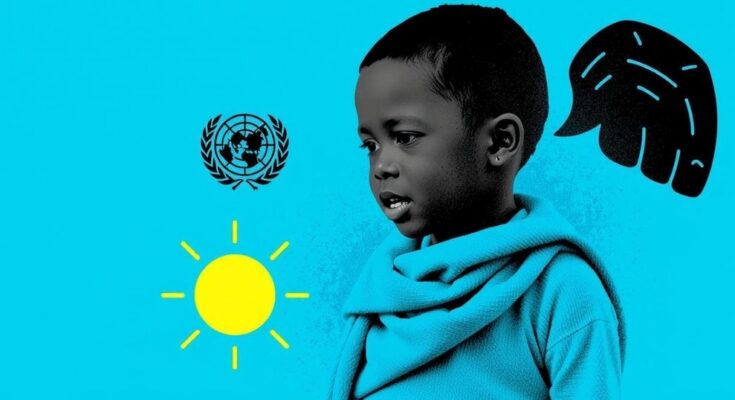UNICEF warns that without urgent action, children’s rights face severe risks from demographic shifts, climate crises, and technology advancements. The future of childhood hangs in the balance, necessitating immediate intervention from global leaders to protect youth interests. Projections for 2050 reveal significant regional population changes and intensified environmental hazards significantly affecting children.
UNICEF has issued a stark warning regarding the precarious future of childhood, emphasizing the need for immediate action to protect children’s rights in an evolving global landscape. On World Children’s Day, UNICEF highlighted three critical megatrends anticipated to impact children’s lives by 2050: demographic shifts, environmental crises, and advancements in technology. UNICEF Executive Director Catherine Russell remarked that incoming dangers, such as climate change and online threats, will intensify, necessitating proactive measures from global leaders now to shape a secure future for the world’s youth. In 2050, approximately 1.3 billion children will inhabit specific regions, with those in the Pacific Islands needing prioritization of investment in essential services to ensure children attain their fullest potential amidst these changes.
UNICEF’s projections suggest that the global population of children under 18 will remain approximately 2.3 billion, yet this stabilizing figure conceals significant regional demographic shifts. The population of older individuals is expected to surge, leading to immense pressures on social and health services as resources become increasingly strained. Notably, the greatest child populations will be situated in economically disadvantaged regions, including parts of Africa and South Asia.
The ongoing climate and environmental crises are imposing existential threats to children’s futures, with nearly half a billion children currently living in high-risk conditions due to climate inaction. These challenges include air pollution, rising sea levels, and the vulnerability of potable water supplies, which disproportionately affect young populations. Without intervention, these environmental dangers will culminate in adverse health outcomes and increased food insecurity, demonstrating the urgency for protective measures that adhere to children’s rights under the UN framework.
Technological advancements present both promise and peril for future generations. While technology can offer empowerment through its integration into educational frameworks, particularly in acquiring digital competency vital for the job market, it also poses risks, including exposure to harmful online content and exploitation of personal information. Unequal access to digital resources exacerbates pre-existing inequalities, particularly affecting marginalized youth populations in low-income regions.
World Children’s Day has reiterated the call for leaders to recommit to safeguarding children’s rights and wellbeing. It is imperative to initiate substantial actions today to lay the groundwork for a more equitable and secure future for coming generations.
The UNICEF report highlights that urgent action is vital to preserve children’s rights amid significant global shifts. The identification of major forces, such as demographic transitions, climate-related challenges, and rapid technological developments, underscores the complexity of the future landscape for children. As UNICEF evaluates these factors, it becomes increasingly clear that strategic planning and investment in children are essential for sustainable development, particularly in regions that will become childhood demographic hubs by 2050.
In conclusion, the precarious future for children necessitates immediate and effective actions to protect their rights amid the evolving challenges posed by demographic changes, environmental crises, and technology. As UNICEF elucidates, leaders must prioritize the wellbeing of children to navigate these complexities and ensure they inherit a better world than the one currently witnessed. A renewed commitment to safeguarding children’s rights is not only mandatory but urgent.
Original Source: www.fijitimes.com.fj




